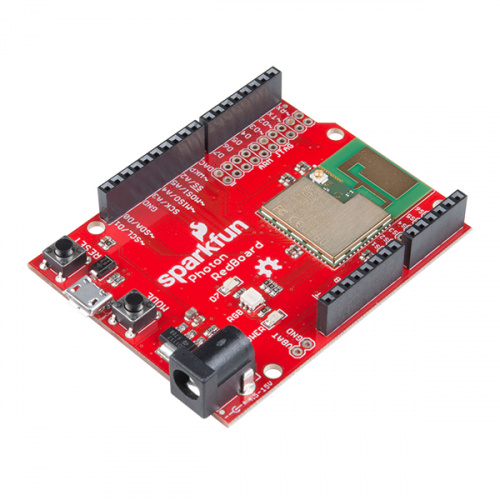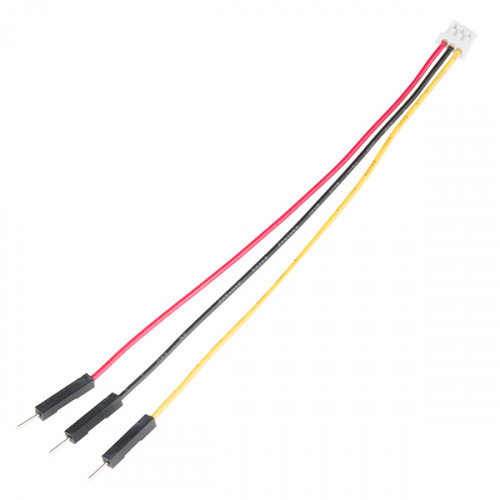Welcome back everyone! This week we have a couple new products, including yet another Photon-based product to talk about. First, let's check out the video as to better spoil the surprise.
That's right, this week the SparkFun Photon RedBoard is shipping! Unfortunately, you'll have to wait until next week for the Photon SIK, but you can place your pre-order. The SparkFun Photon RedBoard is a WiFi/Microcontroller development board in the Arduino form-factor for the Photon. It’s easy to use, it’s powerful, and connected to the cloud. With the best support, potential, and performance the Photon RedBoard provides you with an IoT device with a powerful 120Mhz ARM Cortex M3 and built-in WiFi connectivity.
Every so often, we come across a product that makes us wonder how we've gone this long without it. This little jumper cable is one of those products. It's simple, elegant, and we marvel at how we've survived without it. On one end, it's a 3-pin JST connector that works with a lot of our sensors, LCDs, etc. On the other end are 3 male pins that go into a breadboard. It's that simple. Now you can plug your serial LCD into a breadboard without having to mash the bare wires into the holes.
That's it for this week. Be sure to check back next week for more new stuff. Thanks for reading and watching!








I just keep thinking that $30-40 a board isn't going to get very many people into IoT. It's the same issue Xbee/Zigbee has always had; even the cheapest radios are still too expensive for people to really go nuts with them. For the price of this Photon Redboard I could buy a RaspPi 2B and a wifi dongle! If you want to drive the IoT to a new level, people need $3 radios.
I certainly agree that the RasPi is an awesome deal. But it's not the best choice for every kind of project. The stock Photon is only $19, already has wifi built-in, and is about 1/3 the size of a Pi. And if you are developing your own commercial product, you can bulk purchase the Photon's core module, which will be even smaller and cheaper.
Yes, the ESP8266 is small and cheap, and they are getting easier to develop on thanks to community efforts. I love 'em! But I think you might find trade-offs if you start comparing speed, reliability, and memory. Again, it probably boils down to what is appropriate to your particular projects.
Particle has built a great community for their platform. The forums are full of friendly and knowledgable folks. Their documentation is good. They have a ready-to-go cloud-based IDE and data platform, and the core of that is open source, so you can run your own local version of the cloud services.
The value-add in the RedBoard here is in the Arduino form-factor, power regulator, JTAG header, etc. Is that worth the extra money over a standard Photon package? Maybe not to you, but maybe it is to somebody else who wants a convenient way to prototype using their existing Arduino shields before committing to the platform.
Keep in mind you've got a microcontroller on there too. Even with a $3 radio (like the ESP8266) you still need a microcontroller most of the time. In this case it is all rolled into one with IOT designed low power. Not bad for a mid ranged microcontroller. Though for cheap and easy the ESP8266 is a great option.
Arduino Pro Mini 3.3V x 25: $9 ESP8266 x 25: $6.50 Not sure what the Photon development ecosystem gains me over this setup that I'd pay SF 2X for? Look, I'm not trying to be a downer, I'm just not really seeing the value here, but obviously SF has because they are going all-in with Photon add-on boards, so maybe you can better explain what is so good about it?
In a lot of cases the Pro Mini and ESP8266 will be the better and/or cheaper option for your application. But not always. Two main advantages the Photon has over this setup are an ARM Cortex M3 (at 120MHz) giving you a lot more processing power than a Pro Mini, and FCC certification. Honestly, it is not so much that one option is better than the other, but that they are different options with different features (with only one of those features being price). If the Pro Mini and ESP8266 works fine in your application go for it. If you need faster speed, beefier process, FCC certification, etc., I'd take a look at the Photons (as well as other items on the market). Remember, more options is always good.